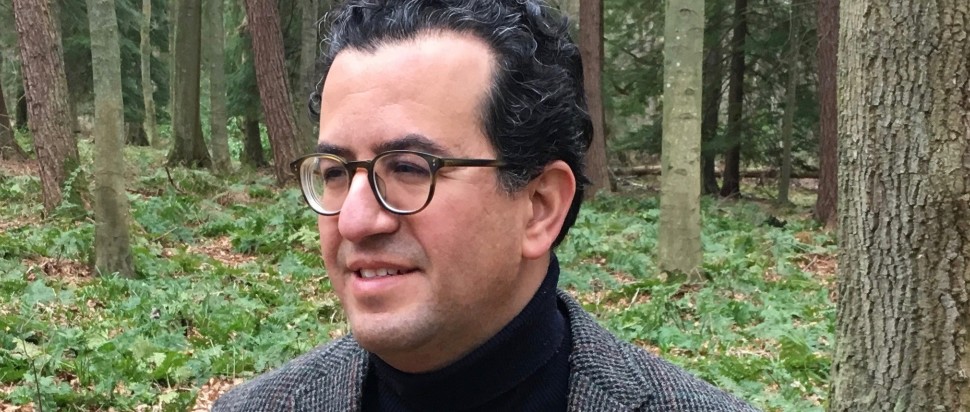Brothers-in-Arms: Hisham Matar on My Friends
We chat with Booker-shortlisted, Pulitzer Prize-winning author Hisham Matar on his newest novel My Friends
Whenever Hisham Matar makes a statement about himself during our phone call, it is often preceded by a self-effacing disclaimer. “This sounds very childish,” he says, “but I've never lost that childlike wonder about the fact that when you are sitting with a book, you are stationary, but if you lock horns with it, you feel yourself cast into a very specific momentum, you know? We take our books for walks, or we walk into them, or through them.”
Yet there doesn’t seem anything particularly childlike about the thought that propelled Matar to write My Friends, his new novel whose reluctant protagonist Khaled begins his story while walking home through London. We first meet Khaled and fellow Libyan immigrant Hosam as they bid each other farewell at King’s Cross station, the entire interaction charged with a history we have not yet learned. “If I try to cast my mind back to the very early beginnings of [the book],” says Matar, “I thought I could spend some time thinking about the relationship of the present to everything that has happened before. That is one of the things that has always fascinated me. The fact that, on some level, we are all in the aftermath. Each one of us has come to this moment through so much.”
At the centre of My Friends are these two University of Edinburgh students, Khaled and Mustafa, whose lives are irrevocably changed by a single event; one that throws them into the dual and paradoxical states of perpetual motion and stasis. Near-fatal injuries, sustained at the hands of their own country’s embassy in London, implicate both young men into the real events of 17 April 1984, in which a gunman opened fire on a crowd of protesters. Miraculously, only one person – a twenty-five year-old police officer – was killed, but Mustafa and Khaled represent two of the eleven further casualties.
“I am painfully aware of the fact that I live in a world where it really matters what gender, race, nationality, religion you are. And it matters horrifically because it calibrates people’s outrage. No one really reported on, or knew of, the fact that as well as the tragic death of Yvonne Fletcher, there were these eleven young men who got shot,” says Matar.
Matar grew up in a political household in Tripoli, Libya. His father was considered a political dissident and was, when Matar was only 19, abducted in Cairo, never to be found again. Matar’s 2016 memoir The Return, for which he won the 2017 Pulitzer Prize, chronicles his own search for what exactly happened. As a boy, he recalls people walking in and out of their home at any time of the day, the hours coloured by the slightly abstract radical dialogues of men committed to a common cause. Breaking up the intensity was the food – a celebration of nature and an expression of love and delight – cooked lovingly by his mother and her sisters.
During phone conversations in My Friends, food is a topic by which Khaled and his parents can bypass the painful and dangerous topic of his fate, for who knows who could be listening. Where speaking straightforwardly could be calamitous, a question posed to his mother about his failed lamb tagine creates space for a reply heartbreakingly packed with subtext: “Khaled, habibi, tell me exactly what you did, and I’ll tell you where you went wrong.”
With the characteristic disclaimer that, of course, it shouldn’t be done in a self-indulgent way, Matar suggests that the writing process itself can engender a certain degree of self-knowledge. “Before I started writing, if you were to ask me what I am passionate about, whatever I would have said would have been both sincere and deeply inaccurate.” But after numerous books, essays and poems published, he explains, “you begin to see the hints of your intellectual and emotional geography, where else you might go, what else you might do.”
Running through all of Matar’s books are people reluctant to accept preconceived models of being or behaving. “That tension I mentioned: between politics and the private life; aesthetics; intellectual life,” he says, “it's a tension that often relies on a very particular idea of masculinity. [That] to be a man is to be a man of action; is to act, to move the world. I think a lot of my characters are wondering about that. They're not sure about that.”
My Friends situates itself around a character who cares deeply. Spoken in many different contexts, the words of Matar’s title contain multitudes. They have begun many a call-to-arms. They have laid blame, betrayed or condemned. But spoken by Khaled, citizen of Hisham Matar’s intellectual landscape, the words become more akin to fingertips placed delicately on an object, as if to take account of its value and its fragility.
My Friends is out 11 Jan via Viking Books. Hisham Matar launches the book at Topping & Company, Edinburgh, 9 Jan
